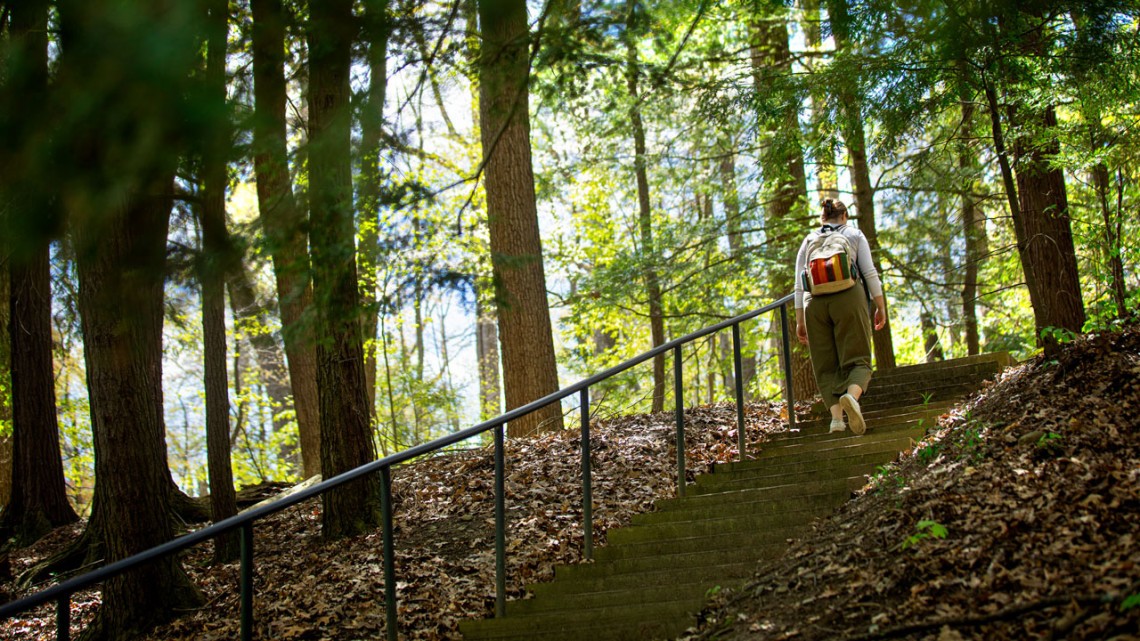
Trails around Beebe Lake provide a scenic alternative to Cascadilla and Fall Creek Gorge trails.
Cornell highlights gorge safety and trail closures
By Krishna Ramanujan
Even brief, regular walks in nature have been shown to benefit mental health and overall wellness. For Cornellians, access abounds within Cornell Botanic Garden’s Natural Areas and Gorge Trails, though care should be taken when strolling and hiking.
For starters, walkers should take note that a section of the Cascadilla Gorge Trail, between the Stewart Avenue bridge and the trail entrance below the Schwartz Center for the Performing Arts, has sustained some damage and needs repair, and will therefore be closed indefinitely. The lower part of the trail, from Linn Street to the Stewart Avenue bridge, and the upper part of the trail, from the College Avenue bridge and upstream, remain open for use.
Staff have installed temporary gates at the Stewart Avenue bridge allowing access to the lower part of the trail. Updates will be posted on the Gorge Safety website as repairs progress.
“We invite people to come and enjoy all the benefits of these natural spaces, but we also ask that people act safely and responsibly,” said Todd Bittner, natural areas director for the Cornell Botanic Gardens and chair of the university’s Gorge Safety Committee. In addition to keeping themselves safe, hikers should avoid damaging or diminishing the area’s beauty, he said.
The Nathaniel Rand ’12 Memorial Gorge Safety Education Program – in memory of a student who drowned in a gorge accident in 2011 – is dedicated to upholding safety principles and informing the public about them.
As part of these goals, since 2012, Cornell Outdoor Education (COE) has managed the Gorge Stewards Program, in which students and community members act as ambassadors for the gorges, educating visitors about their nature, geology and history; identifying unsafe practices; providing directions; and informing visitors how to safely explore them.
Last year, COE staff took on some of these responsibilities, because students couldn’t be hired due to the pandemic, and coordinators were available for other duties with camps closed. This year, the program is back in operation with students and community-member stewards.
The gorge stewards, the Gorge Safety Committee and Natural Areas staff are all guided by four principles:
- building awareness around the inherent dangers present in the gorges;
- maintaining and improving trails, staircases, railings, signage and fences;
- promoting safety by informing visitors about campus and gorge regulations; and
- highlighting alternatives to unsafe practices and behaviors.
Thanks to these measures and the Gorge Stewards Program, the number of violations of gorge regulations dropped from more than 8% of all known users in 2013 to less than 0.5% in 2019, Bittner said. However, in 2020, violations jumped to 7.4%, likely due to public health measures to contain COVID-19 that limited access to public swimming and recreation. Compliance is expected to improve this summer, with the easing of pandemic restrictions.
The programs advocate basic safety guidelines: Stay on trails or within designated areas; no bicycles on the trails; no swimming; and do not walk on closed trails or other restricted areas marked by fences, gates or railings.
Swimming, in particular, is extremely dangerous and can lead to death, and is strictly prohibited in the gorges at all times. The Gorge Safety site can direct people to information on safe outdoor swimming options off campus.
Also, Natural Areas staff members have marked trails and walkway intersections with orientation signs, so people can easily find their way within the Botanic Gardens natural areas and to and from campus areas. Red emergency locator signs have been installed along the gorge trails to help hikers in distress provide their locations to first responders.
To educate and familiarize new students before classes begin each year, the Gorge Safety Education Program offers orientation hikes. Along with policy reviews for guides and residence advisers, freshman and transfer students are required to watch the program’s gorge safety video; a gorge safety brochure and other information can also be found on the Gorge Safety website.
Tompkins County has more than 240 miles of trails, including 30 miles of trails across the Botanic Gardens’ natural areas.
Media Contact
Get Cornell news delivered right to your inbox.
Subscribe
